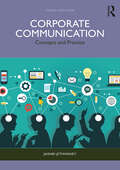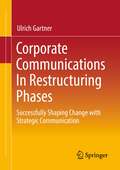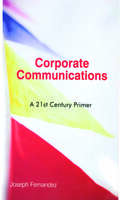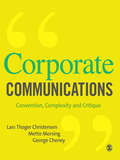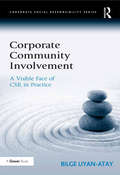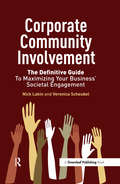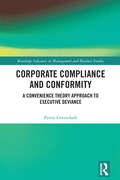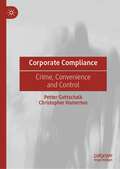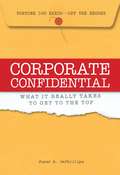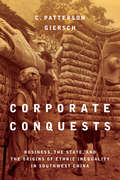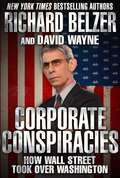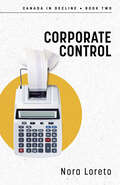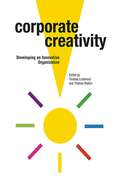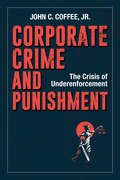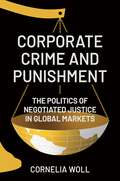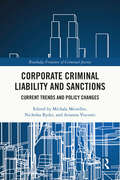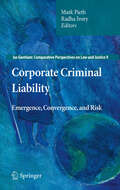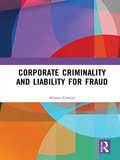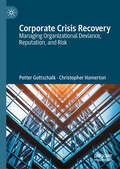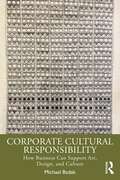- Table View
- List View
Corporate Communication: Concepts and Practice
by Jaishri JethwaneyCorporate Communication: Concepts and Practice—a comprehensive and engaging textbook—helps in understanding the underlying concepts and real-life strategies of communication in modern-day corporate set-ups. One of the youngest management disciplines, corporate communication is used by companies to position themselves to the outside world in a highly competitive business environment and to build a “sense of being,” on the one hand, and creating a feeling of pride in being associated with the company for various stakeholders, especially the employees and investors. Some of the functions of corporate communication include identifying and segmenting stakeholders, articulating brand positioning, selecting appropriate channels of internal and external communication, and managing crises, conflicts, and reputations, among others. This revised edition offers a fresh perspective into all basic and critical aspects of corporate communication and incorporates the latest changes in governmental policies and industry trends to aid students adapt to the contemporary business environment and become industry-ready. This book will be of great interest to students and researchers working in the areas of corporate communication, organizational communication, journalism, mass communication, communication studies, public relations, and human resource management.
Corporate Communications In Restructuring Phases: Successfully shaping change with strategic communication
by Ulrich GartnerThis book provides those responsible in communication, management and human resources with a practical guide for professional internal and external communication of restructuring programs in companies. From cost-cutting measures to downsizing to the closure of entire locations: changing economic framework conditions and the associated changes are not only an operational challenge, they also require intelligent communication. If this fails, long-term costs through collateral damage such as declining employee motivation or loss of reputation can wipe out the short-term savings.This book shows in a compact way how you can identify key stakeholders, define communicative goals and develop the infrastructure, content and instruments with which you can strategically achieve these goals.The author gives concrete tips, describes concrete procedures and asks targeted questions for success in difficult times.
Corporate Communications: A 21st Century Primer (Response Books)
by Joseph FernandezThis lucid book is a compelling introduction to corporate communications and its practical application in the modern organization. Joseph Fernandez makes a case for corporate communications as the cornerstone of any corporate growth strategy. He does this by highlighting communication approaches drawn from the worlds of advertising, journalism and public relations. Among the topics discussed are: - The evolution and nature of the new era and its unique communication needs. - The role of advertising and public relations as potent tools to build corporate brands and nurture them in global environments. - The advantages of the complementary use of traditional and new media in reaching the entire targeted audience. - The importance of subscribing to healthy corporate citizenship practices for both businesses and non-profit outfits.
Corporate Communications: Convention, Complexity and Critique
by Mette Morsing Dr George E. Cheney Dr Lars T. ChristensenThe field of corporate communications describes the practices organizations use to communicate as coherent corporate `bodies'. Drawing on the metaphor of the body and on a variety of theories and disciplines the text challenges the idealized notion that organizations can and should communicate as unified wholes. The authors pose important questions such as: - Where does the central idea of corporate communications come from? - What are the underlying assumptions of most corporate communications practices? - What are the organizational and ethical challenges of attempting truly `corporate' communication? Clearly written with international vignettes and executive briefings, this book shows that in a complex world the management of communication needs to embrace multiple opinions and voices. Rewarding readers with a deeper understanding of corporate communications, the text will be a `must read' for advanced undergraduates, graduate students, and scholars, in the arenas of corporate communications, organizational communication, employee relations, marketing, public relations and corporate identity management. Practitioners in these areas will be provoked to re-examine their assumptions and habits.
Corporate Community Involvement: A Visible Face of CSR in Practice (Corporate Social Responsibility)
by Bilge Uyan-AtayThere has been tremendous growth in Corporate Community Involvement (CCI) projects of all sizes in recent years. This has been encouraged by organisations such as Business in the Community in the UK, which provides information designed to motivate businesses and government to engage in CCI. In fact, the projects incorporated into some companies’ strategy implementation are now so extensive that they are having a profound impact on community development. Corporate Community Involvement examines CCI as a distinct type of corporate social responsibility and the nature of the relationship between business and society. Bilge Uyan-Atay considers that CCI has been poorly described and researched, concentrating mainly on Western Europe and the USA, failing to consider different institutional contexts and to make the best use of available theory to uncover a more holistic perspective. The author’s native Turkey is a secular, developing country with a growing economy. This provides a distinctive environment in which to study CCI. The author explores and analyses economic, strategic, cultural and institutional influences on CCI and its relationships to and differences from corporate social responsibility.
Corporate Community Involvement: The Definitive Guide to Maximizing Your Business' Societal Engagement
by Nick Lakin Veronica Scheubel"We need to do Community Involvement better – we know we're spending millions each year on charitable causes; how can we find out what is really effective and what people will appreciate us for? Who should we partner with? How can we make a real difference in society and help our business?" Companies around the world are trying to answer these questions. Many are asking the same questions even as, collectively, they continue to spend billions on their communities. How do they know which activities are really worthwhile? Building on the authors' own extensive global experience at Nokia and E.ON, as well as the experience of many other experts in the field, this book offers the first-ever "how to" roadmap for managers on the comprehensive implementation of strategic Community Involvement inside their companies. It is designed to be practical, for those who want to act upon what they have read. It will fill a long-neglected niche as a day-to-day reference guide for practitioners. Corporate Community Involvement demonstrates what to do and how to do it. The advice is backed up by inspiring interviews with best-in-class practitioners from businesses such as Microsoft, GlaxoSmithKline, Ericsson, and Deutsche Bank and leading international Corporate Responsibility and Community Involvement experts. The book highlights proven best-practice approaches, effective methods, and concise tools to help managers "get there faster" and "get it right first time." The core of the book is a step-by-step guide to developing and implementing a comprehensive and successful approach to Corporate Community Involvement. It shows how to: conduct a current state analysis and devise a strategy, organize staffing and budgets, integrate Corporate Community Involvement throughout the business and create high-profile programs, partner across sectors, measure and evaluate results, communicate successful activities, and overcome challenges. Corporate Community Involvement has an international perspective: the models and principles advocated are adaptable anywhere in the world. Also, it is designed to have as much relevance to a small or medium-sized enterprise as to a multinational. The book outlines the history and future of Corporate Community Involvement, explaining the business context and why companies need to manage their programs strategically. It also distinguishes between the growing lexicon of terminologies and provides clear definitions of terms such as "philanthropy", "sponsorship", "Corporate Citizenship", "Corporate Responsibility" and "Sustainability", advising when they are appropriate and how each can add value to corporate activities. This will be an indispensible resource for those working at the interface between business and the community. New or developing practitioners will learn from both the successes and failures of those before them. Representatives from other sectors, notably government, international agencies, NGOs, and academia, will come to understand companies' internal requirements for cross-sector collaboration programs in the community better. And students interested in this field will be better equipped to start careers.
Corporate Compliance and Conformity: A Convenience Theory Approach to Executive Deviance (Routledge Advances in Management and Business Studies)
by Petter GottschalkTraditionally, control in organizations is concerned with top-down approaches, where executives attempt to direct their employees’ attention, behaviors, and performance to align with the organization’s goals and objectives. This book takes a new approach by turning the problem of control upside down as it focuses on control of executives who find white-collar crime convenient. The bottom-up approach to executive compliance focuses on organizational measures to make white-collar crime less convenient for potential offenders. Rather than focusing on the regulatory formalities and staged procedures of compliance and audits, the book emphasizes the organizational challenges involved in compliance work when trusted corporate officials exhibit deviant behavior, refining, and advancing knowledge in this field by reference to contemporary international case studies and associated original evaluative research. The themes and cases covered are carefully selected to provide the reader with an insight into professional conduct and procedural practice – the organization of corporate compliance success, failure, and corruption – with the theory of convenience placed at the fore. It is the bottom-up approach by application of convenience theory that makes the proposed book unique compared to other books on corporate compliance. This book is a valuable resource for scholars and upper-level students researching and studying in the areas of business administration, organizational behavior, corporate and white-collar crime, as well as business ethics and auditing.
Corporate Compliance: Crime, Convenience and Control
by Petter Gottschalk Christopher HamertonCompliance has long been identified by scholars of white-collar crime as a key strategic control device in the regulation of corporations and complex organisations. Nevertheless, this essential process has been largely ignored within criminology as a specific subject for close scrutiny – Corporate Compliance: Crime, Convenience and Control seeks to address this anomaly. This initiating book applies the theory of convenience to provide criminological insight into the enduring self-regulatory phenomenon of corporate compliance. Convenience theory suggests that compliance is challenged when the corporation has a strong financial motive for illegitimate profits, ample organisational opportunities to commit and conceal wrongdoing, and executive willingness for deviant behaviour. Focusing on white-collar deviance and crime within corporations, the book argues that lack of compliance is recurrently a matter of deviant behaviour by senior executives within organisations who abuse their privileged positions to commission, commit and conceal financial crime.
Corporate Confidential
by Susan A. DephillipsObtaining advancement in corporate America is not always nice, fair, or easy. In today's climate of economic uncertainty, you need every ounce of leverage to improve your career standing and potential. The harsh reality: If you're not constantly moving forward, you're losing professional ground-and more aggressive colleagues won't hesitate to poach your position, projects, and opportunities.
Corporate Confidential
by Susan A. DephillipsCorporate Confidential is an honest look at the unspoken truths surrounding success and failure in corporate America. Fifty senior-level executives disclose the candid realities of reaching the executive suite, including how: Refusing to play politics is professional suicide; Pursuing work/life balance will label you as a "B" player; Women unknowingly continue to sabotage their success; and more. So controversial that some executives would only participate on the promise of anonymity, Corporate Confidential provides simple, candid answers on what it really takes to achieve success in today's corporate world.
Corporate Confidential: Fortune 500 Executives Off the Record - What It Really Takes to Get to the Top
by Susan A DephillipsA Simon & Schuster eBook. Simon & Schuster has a great book for every reader.
Corporate Conquests: Business, the State, and the Origins of Ethnic Inequality in Southwest China
by C. Patterson GierschTenacious patterns of ethnic and economic inequality persist in the rural, largely minority regions of China's north- and southwest. Such inequality is commonly attributed to geography, access to resources, and recent political developments. In Corporate Conquests, C. Patterson Giersch provides a desperately-needed challenge to these conventional understandings by tracing the disempowerment of minority communities to the very beginnings of China's modern development. Focusing on the emergence of private and state corporations in Yunnan Province during the late 1800s and early 1900s, the book reveals how entrepreneurs centralized corporate power even as they expanded their businesses throughout the Southwest and into Tibet, Southeast Asia, and eastern China. Bringing wealth and cosmopolitan lifestyles to their hometowns, the merchant-owners also gained greater access to commodities at the expense of the Southwest's many indigenous minority communities. Meanwhile, new concepts of development shaped the creation of state-run corporations, which further concentrated resources in the hands of outsiders. The book reveals how important new ideas and structures of power, now central to the Communist Party's repertoire of rule and oppression, were forged, not along China's east coast, but along the nation's internal borderlands. It is a must-read for anyone wishing to learn about China's unique state capitalism and its contribution to inequality.
Corporate Conservatives Go to War: How the National Association of Manufacturers Planned to Restore American Free Enterprise, 1939–1948 (Palgrave Studies in American Economic History)
by Charlie WhithamWorld War II presented a unique opportunity for American business to improve its reputation after years of censure for inflicting the Great Depression upon the nation. No employers’ organization worked harder or devoted greater resources to reviving business prestige during the war than the National Association of Manufacturers, which spent millions of dollars on promoting the indispensability of private enterprise to the successful mobilization of the American economy in an uncompromising multi-media campaign which spanned the factory floor to the movie theatre. Now, using unpublished primary sources, the full extent of the NAM’s wartime mission to raise the stature of American business in the post-war era is revealed. During the war the NAM erected a vast structure of research on an unprecedented scale numbering more than one hundred persons dedicated to planning the best solutions for restoring American ‘free enterprise’ capitalism after the war in a direct challenge to the ‘liberal’ prescriptions of the reigning administration. These studies were painstakingly assembled and widely distributed and served as a complimentary arm to the better-known pro-business propaganda message of the organization. What emerges is a unique and telling glimpse into the minds of the corporate class of wartime America that reveals the determination of a major employers’ organization to exploit the exceptional circumstances of total war to influence both the power-brokers in Washington who wrote economic policy and the American public as a whole to embrace a post-war future ruled by private enterprise capitalism.
Corporate Conspiracies: How Wall Street Took Over Washington
by Richard Belzer David WayneFrom New York Times bestselling authors Richard Belzer and David Wayne comes a hard look at the wrongs done to us all by big business in America. Here is an explosive account of wrongful acts perpetrated, and the ensuing cover-ups inflicted upon us, by American corporations. The bestselling author team of Richard Belzer and David Wayne exposes the ways that the capitalist regime has got us under their thumbs—from the mainstream media and its control over us, to the trillions stolen by big banks and mortgage companies during the mortgage crisis, to the scams perpetrated by Big Oil and Big Pharma. The one common victim of all that corruption is the American public, and Corporate Conspiracies wants to do something about it.Corporate Conspiracies takes dead aim at those who take advantage of us little guys. Probably most disturbing is the book's examination of politics and capitalism teaming up against us—how politicians and lobbyists all have their hands in each other's pockets while stabbing us in the back, and how the well-established energy lobby—which is petroleum, natural gas, and coal—has played a dominant role in the shaping of US foreign policy for decades. Did you know that companies at times know that their products will kill people, but they do nothing, because it is actually cheaper to compensate the victims than it is to correct the problem? And did you know that the Pentagon is sending $1.5 trillion of our tax dollars to their corporate buddies for a new fighter jet that is already superfluous? This book is guaranteed to make us all think twice about being enslaved and cheated by corporate America. Skyhorse Publishing, as well as our Arcade imprint, are proud to publish a broad range of books for readers interested in history—books about World War II, the Third Reich, Hitler and his henchmen, the JFK assassination, conspiracies, the American Civil War, the American Revolution, gladiators, Vikings, ancient Rome, medieval times, the old West, and much more. While not every title we publish becomes a New York Times–bestseller or a national bestseller, we are committed to books on subjects that are sometimes overlooked and to authors whose work might not otherwise find a home.
Corporate Control: Canada in Decline Book Two (Canada in Decline)
by Nora LoretoHow deep does corporate dominance go in Canada? The second book in Nora Loreto’s landmark series dives into the corporate web spun around Canada’s economy, society, and politics. The joke goes that Canada is three mining companies in a trench coat. Or three oil companies in a trench coat. Or three telecom companies in a trench coat. It’s funny because it’s almost true: a handful of corporations exert a disproportionate amount of power over Canadian democracy. Corporate profits are at a record high, and the divide between the rich and the poor has never been wider. Canadians are struggling with affordability, the housing crisis, and wages that don’t cover basic needs. The combination of these forces is a pressure cooker that politicians have promised to tackle, except they can’t: they are too restricted by corporate power to confront the roots of the problems Canadians face. The first book in the Canada in Decline series examines the rise and fall of Canada’s social safety net. In this next volume, Loreto goes further, identifying why Canadian politicians seem impotent in the face of corporate Canada.
Corporate Creativity: Developing an Innovative Organization
by Thomas Lockwood Thomas WaltonCorporate Creativity is the ultimate guide for executives and managers looking to increase creativity and innovation in their companies. This anthology of provocative essays, drawn from the pages of Design Management Review and Design Management Journal, explores personal, team, and organizational creativity, and it is packed with insights from the most respected names in the industry: Jeffrey Mauzy, Robert Rassmussen, Leonard Glick, Gerald Nadler, Stefano Marzano, and many others. These experts reveal how leading companies foster a creative culture and maximize talent resources. Essays explore managing creative staff, improving creative abilities of employees, taking risks, designing teams, integrating design and corporate philosophy into the management process, branding, and much more. Corporate Creativity is a must-have for anyone working to maximize creative potential in the workplace.
Corporate Crime Under Attack: The Fight to Criminalize Business Violence
by Gray Cavender Francis T. Cullen William J. Maakestad Michael L. BensonIn exploring the criminalization of corporations, this book uses the landmark "Ford Pinto case" as a centerpiece for exploring corporate violence and the long effort to bring such harm within the reach of the criminal law. Corporations that illegally endanger human life now must negotiate the surveillance of government regulators and risk civil suits from injured parties seeking financial compensation. They also may be charged with criminal offenses and their officials sent to prison.
Corporate Crime and Punishment: The Crisis of Underenforcement
by John C. Coffee Jr."Professor Coffee's compelling new approach to holding fraudsters to account is indispensable reading for any lawmaker serious about deterring corporate crime."—Robert Jackson, former Commissioner, Securities and Exchange Commission In the early 2000s, federal enforcement efforts sent white collar criminals at Enron and WorldCom to prison. But since the 2008 financial collapse, this famously hasn't happened. Corporations have been permitted to enter into deferred prosecution agreements and avoid criminal convictions, in part due to a mistaken assumption that leniency would encourage cooperation and because enforcement agencies don't have the funding or staff to pursue lengthy prosecutions, says distinguished Columbia Law Professor John C. Coffee. "We are moving from a system of justice for organizational crime that mixed carrots and sticks to one that is all carrots and no sticks," he says. He offers a series of bold proposals for ensuring that corporate malfeasance can once again be punished. For example, he describes incentives that could be offered to both corporate executives to turn in their corporations and to corporations to turn in their executives, allowing prosecutors to play them off against each other. Whistleblowers should be offered cash bounties to come forward because, Coffee writes, "it is easier and cheaper to buy information than seek to discover it in adversarial proceedings." All federal enforcement agencies should be able to hire outside counsel on a contingency fee basis, which would cost the public nothing and provide access to discovery and litigation expertise the agencies don't have. Through these and other equally controversial ideas, Coffee intends to rebalance the scales of justice.
Corporate Crime and Punishment: The Politics of Negotiated Justice in Global Markets
by Cornelia WollThe geopolitics of American law enforcement and how it changed corporate criminal accountability in other countriesOver the past decade, many of the world’s biggest companies have found themselves embroiled in legal disputes over corruption, fraud, environmental damage, tax evasion, or sanction violations. Corporations including Volkswagen, BP, and Credit Suisse have paid record-breaking fines. Many critics of globalization and corporate impunity cheer this turn toward accountability. Others, however, question American dominance in legal battles that seem to impose domestic legal norms beyond national boundaries. In this book, Cornelia Woll examines the politics of American corporate criminal law’s extraterritorial reach. As governments abroad seek to respond to US law enforcement actions against their companies, they turn to flexible legal instruments that allow prosecutors to settle a case rather than bring it to court. With her analysis of the international and domestic politics of law enforcement targeting big business, Woll traces the rise of what she calls “negotiated corporate justice” in global markets.Woll charts the path to this shift through case studies of geopolitical tensions and accusations of “economic lawfare,” pitting the United States against the European Union, China, and Japan. She then examines the reactions to the new legal landscape, describing institutional changes in the common law countries of the United Kingdom and Canada and the civil law countries of France, Brazil, and Germany. Through an insightful interdisciplinary analysis of how the prosecution of corporate crime has evolved in the twenty-first century, Woll demonstrates the profound transformation of the relationship between states and private actors in world markets, showing that law is part of economic statecraft in the connected global economy.
Corporate Crime in China: History and contemporary debates (Routledge-WIAS Interdisciplinary Studies)
by Zhenjie ZhouCorporate crime in China has garnered worldwide attention and in the recent years we have witnessed positive legislative and administrative efforts by the Chinese government to prevent corporate misconducts. This book first defines the meaning of corporate crime in China and answers the basic questions of what corporate crime is through real life cases. Then, it introduces the history of corporate crime and reviews academic studies through these key questions. The book also discusses the scope of corporate crime, the basis of corporate criminal liability, the criminal liability of State organizations, the corporate compliance programs and corporate criminal liability and the procedural issues. The book also provides suggestions from a comparative perspective by referring to the latest global developments on corporate crime. In the concluding chapter, the book discusses the goals of corporate crime prevention policy and comes up with feasible reform proposals with a brief summary on the existing problems of the current policies through a macro perspective. There is no existing book that deals with the legislation and criminal justice practices of corporate crime in China and this book will help to shed insight into the subject.
Corporate Criminal Liability and Sanctions: Current Trends and Policy Changes (Routledge Frontiers of Criminal Justice)
by Nicholas Ryder Michala Meiselles Arianna ViscontiThis edited collection sheds light on the evolution of corporate financial crime, exploring a myriad of offenses ranging from money laundering and fraud to market manipulation and bribery.Considering and assessing the models used in national law to determine the culpability of corporations, this book compares the different schemes used to address financial and other organisational crimes committed by these entities. Through a combination of history, law, and global perspectives, its chapters dissect landmark cases and provide detailed analyses of money laundering, fraud, market manipulation, manslaughter, and legislative responses in various locations around the world. This comparative approach offers a unique lens, exploring diverse jurisdictions and shedding light on global patterns of corporate wrongdoing. By critically assessing the challenges of prosecuting economic crimes on a large scale, the collection proposes innovative solutions, including the introduction of ‘failure to prevent’ offences.Corporate Criminal Liability and Sanctions: Current Trends and Policy Changes is a valuable resource for academics, professionals, and anyone intrigued by the ever-evolving realm of white-collar and corporate wrongdoing. It will appeal to scholars across the fields of law, criminology, sociology, and economics, as well as those professionally engaged in preventing and investigating corruption and in developing or enforcing regulation, such as solicitors, barristers, businessmen, and public servants.
Corporate Criminal Liability: Emergence, Convergence, and Risk (Ius Gentium: Comparative Perspectives on Law and Justice #9)
by Mark Pieth Radha IvoryWith industrialization and globalization, corporations acquired the capacity to influence social life for good or for ill. Yet, corporations are not traditional objects of criminal law. Justified by notions of personal moral guilt, criminal norms have been judged inapplicable to fictional persons, who 'think' and 'act' through human beings. The expansion of new corporate criminal liability (CCL) laws since the mid-1990s challenges this assumption. Our volume surveys current practice on CCL in 15 civil and common law jurisdictions, exploring the legal conditions for liability, the principles and options for sanctioning, and the procedures for investigating, charging and trying corporate offenders. It considers whether municipal CCL laws are converging around the notion of 'corporate culture', and, in any case, the implications of CCL for those charged with keeping corporations, and other legal entities, out of trouble.
Corporate Criminality and Liability for Fraud
by Alison CroninThrough a rational reconstruction of orthodox legal principles, and reference to cutting-edge neuro-science, this book reveals some startling truths about the criminal law, its history and the fundamental doctrines that underpin the attribution of criminal fault. While this has important implications for the criminal law generally, the focus of this work is the development of a theory of corporate criminality that accords with modern theory of group agency, itself informed by advancements in contemporary philosophy and social science. The innovation it proposes is the theoretical and practical means by which criminal fault can be attributed directly to the corporate actor, where liability cannot or should not be reduced to its individual members.
Corporate Crisis Recovery: Managing Organizational Deviance, Reputation, and Risk
by Petter Gottschalk Christopher HamertonThe principal aim of Corporate Crisis Recovery: Managing Organizational Deviance, Reputation, and Risk is to complement and expand criminological discourse on the concept of the social license to operate as a means of influencing the behaviour of corporations. In recent years, the wide-spanning consequences of some very public globalized corporate crises – including fiscal and environmental impact, staff retention, and organizational survival – have led to a growing body of research on crisis perception and responsive strategic management. Developments that position corporate crisis recovery as an anticipated requirement of visible compliance to normalized and anticipated standards of ethical practice and business conduct. Utilizing convenience theory to illustrate how corporations, and the individuals therein, are able to lose, repair, and recover the corporate license to operate after corruption and scandal, the book develops to evaluate the responses of the public and criminal justice process to serious reputational damage and substantial breach of trust.
Corporate Cultural Responsibility: How Business Can Support Art, Design, and Culture
by Michael BzdakIs corporate investing in the arts and culture within communities good business? Written by an expert on the topic who ran the Corporate Art Program at Johnson & Johnson, the book sets out the case for business patronage of the arts and culture and demonstrates how to build an effective program for businesses to follow. As companies seek new ways to add value to society, this book places business support of the arts in a corporate social responsibility context and offers a new concept: Corporate Cultural Responsibility. It discusses the issues underlying business support of the arts and explores new avenues of collaboration and value creation. The framework presented in the book serves as a guide for identifying the key attributes and projected impact of successful and sustainable models. Unlike other books centered on the relationship of art and commerce, this book looks at the broader and global implications of Corporate Cultural Responsibility. It also usefully sets the discussion about the role of philanthropy and corporate social responsibility and the arts within an historical timeframe. As the first book to link culture to community responsibility, the book will be of particular relevance to corporate art advisors and auction houses, as well as students of arts management and corporate social responsibility at advanced undergraduate and postgraduate levels.
